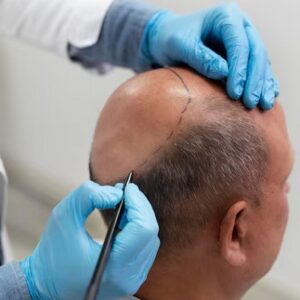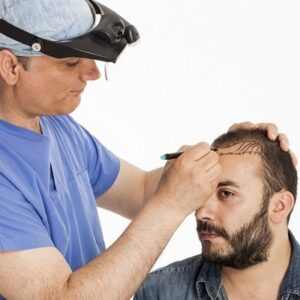
Because they provide patients confidence by making their hair seem normal, hair transplants are now trusted worldwide. Still, this operation has hazards, just like any other. Therefore, many individuals worry about their chances of developing an infection after it. Hence, they ask Can I Get an Infection After A Hair Transplant? So, this blog will discuss how probable infections are, how to prevent them, and what to do if you believe you may have an infection.
Hair Transplant Procedure:
It is a cosmetic procedure wherein a surgeon relocates hair follicles from one body region to bald or thinning head sections. Usually, they relocate them from the rear or sides of the scalp. Furthermore, they mostly use FUE (Follicular Unit Extraction) and FUT (Follicular Unit Transplantation). These techniques include creating tiny incisions or punctures in the head. Hence, there is a risk of infection if you do not adequately care for the wound throughout the healing process.
Can I Get an Infection After A Hair Transplant?
As it involves incisions in the process, extreme care is needed during and after it. However, Can I Get an Infection After A Hair Transplant? Indeed, diseases may follow a hair transplant, but if the correct course of action is followed, they are sporadic. The skull is delicate; hence the injected cells must recover after surgery. Illnesses-causing microorganisms may more readily enter the skin during this period.
Infections might strike the receiver area where surgeons place hair follicles. Similarly, it can happen at the donor area where they extract them. Still, if you follow your surgeon’s advice, your infection risk is minimal.
Causes of Infection After a Hair Transplant:
Many reasons might cause an illness after a hair transplant. Among them are:
- If you neglect to wash your head, bacteria might enter the open wounds resulting from the hair transplant.
- Using unwashed hands, touching or scratching your head runs the risk of allowing bacteria into the little wounds.
- Getting an illness is more probable if you opt for filthy water sources like swimming pools or hot tubs.
- Ignoring advice from your doctor on washing, applying medications, or properly caring for your hair after surgery might cause you to get sick.
- Smoking reduces blood flow to the head, which might cause the skull to heal more slowly and increase your risk of an infection.
Symptoms of Infection After a Hair Transplant:
Though they are not frequent, knowing what infections look like can help you to respond should needed. After a hair transplant, these are some of the most often occurring symptoms of an infection:
- Around the given donation area, there might be redness or edema.
- Having discharge or pus on top of your head.
- More in the provider or receiver region, it aches or feels painful.
- Experiencing illness or a fever.
- An overabundance of crusting or scabbing at the graft sites.
- The odd odor emanating from the head.
- If you exhibit these symptoms, you should immediately contact your surgeon or other healthcare practitioner.
How to Prevent Infection After a Hair Transplant:
You may prevent being sick with the correct care and precautions. Use these crucial guidelines to reduce your chance of an infection after your hair transplant:
- Follow doctor’s aftercare guidelines for hair washing, product usage, and skin contact.
- Ensure scalp cleanliness to reduce infection risk. Use light, mild shampoo, and avoid strong chemicals.
- Avoid picking or scraping the scalp to prevent infection.
- Follow prescribed medication to prevent disease.
- Avoid damaging environments like saunas, swimming pools, and hot tubs until the surgeon clears.
- Sleep with the head up to reduce swelling and speed up healing.
- Quit smoking to reduce the risk of diseases and slow healing.
- Regular follow-up visits to the surgeon are needed to ensure there are no signs of infection or disorders during the healing process.
What to Do If You Have an Infection?
If you believe you have an ailment, the most crucial thing to do is phone your surgeon straight immediately. They may investigate the affected region and provide recommendations on future actions. At certain times, medications may help to cure infections. However, the disease can call for more excellent medical assistance in more severe circumstances.
Seeking expert assistance is much better than attempting to handle the issue alone. Ignoring therapy could aggravate the condition and lead to problems like lost grafted hair follicles or scars that never go away.
Final Thoughts:
Though they are uncommon, infections can sometimes follow a hair transplant. By closely following your surgeon’s post-operative instructions, maintaining your cleanliness, and avoiding any infection hazards, you may significantly reduce the possibility of difficulties. If you believe you could be sick, immediately contact your doctor to prevent additional complications.
If you want a safe hair transplant or to discuss aftercare, consult the best hair transplant surgeons at Dynamic Clinic PK today.












